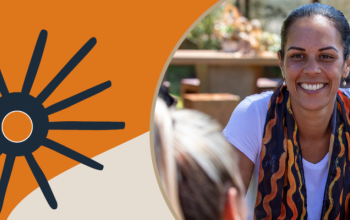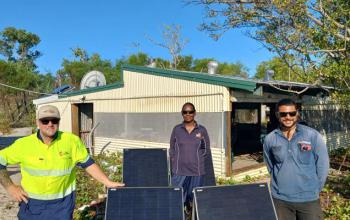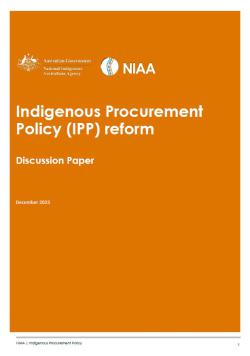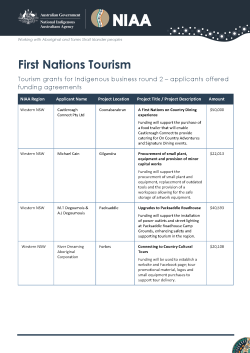Indigenous Peoples Economic and Trade Cooperation Arrangement (IPETCA)
The Indigenous Peoples Economic and Trade Cooperation Arrangement (IPETCA) is a non-binding cooperation-based arrangement which acknowledges the importance of Indigenous economic empowerment through inclusive approaches to trade. IPETCA upholds that Indigenous peoples have the right to be free from discrimination and to fully enjoy all rights affirmed and established under applicable international and domestic law. IPETCA provides a framework and structure for participating economies and Indigenous peoples to establish dialogues, partnerships and to work together to address challenges, with a focus on international trade.
Activities under IPETCA are determined through the IPETCA Partnership Council. The IPETCA Partnership Council works to identify opportunities for Indigenous businesses and can propose activities that will identify and remove the barriers Indigenous people face when participating in international trade.
You can refer to the IPETCA text and the IPETCA Partnership Council Terms of Reference under related resources.
Objectives
At the heart of IPETCA are cooperation activities, developed and advanced in partnership with the Indigenous representatives of the member economies with the objective of sharing knowledge and best practices and increasing Indigenous peoples’ participation in the economy and international trade.
IPETCA commits participating economies, in partnership with Indigenous peoples, to work on enhancing the ability of Indigenous peoples and businesses, including those led by women, youth, persons with disabilities, and persons with diverse sexual orientations and gender identities, to fully access and benefit from the opportunities created by international trade.
These objectives will be advanced through joint cooperation activities that will promote Indigenous-owned businesses and the fuller integration of Indigenous peoples into the formal economy, including through business development services for Indigenous peoples and programmes to improve Indigenous peoples’ digital skills and access to online business tools.
IPETCA strives to address barriers, through a range of provisions that seek to increase Indigenous peoples’ participation in trade as part of continued commitment to advancing reconciliation and Indigenous economic empowerment.
The Partnership Council will determine the cooperation activities, with potential activities outlined below:
- sharing of experiences and best practices in designing, implementing, monitoring, evaluating and strengthening policies and programs to enhance Indigenous peoples’ participation in domestic, regional and global economies;
- working with Indigenous peoples to identify barriers to participation in international trade and designing strategies to address or remove them;
- promoting the participation of Indigenous women-owned businesses in local, regional, and global value chains; and
- exchanging views and exploring options in implementing and supporting Indigenous peoples to maintain, control, protect and develop their cultural heritage, traditional knowledge and traditional cultural expression.
History
Initiated by New Zealand during its Asia-Pacific Economic Cooperation (APEC) host year, the IPETCA initiative was discussed with interested economies in the margins of APEC meetings in February 2021 and over the course of the year. Indigenous peoples in APEC economies, including Australian business leaders, were engaged during the development of the IPETCA initiative.
Participating economies were invited to declare their intention to join IPETCA in December 2021. The founding members of IPETCA are New Zealand, Canada, Chinese Taipei and Australia.
An IPETCA Interim Body was formed in October 2022, with the objective of determining the governance and establishment of the IPETCA Partnership Council and to shape the arrangements for the Partnership Council going forward. The Interim Body comprised two Indigenous leaders from each of the participating economies to provide advice, and two government officials to support the process.
Australia’s representatives on the Interim Body were Leah Armstrong (First Australians Capital) and Darren Godwell (i2i Global), and one official from each of the National Indigenous Australians Agency (NIAA) and the Department of Foreign Affairs and Trade (DFAT). The Interim Body met regularly over late 2022 and 2023, with its final meeting in October 2023. At this meeting there was a resolution to form the IPETCA Partnership Council, agreement to the proposed Partnership Council Terms of Reference and agreement to dissolve the Interim Body.
The newly formed Partnership Council comprises two Indigenous leaders from each of the participating economies who provide advice, and two government officials who support the process.
Australia’s Indigenous representatives were appointed through an Indigenous-led recruitment process and are Leah Armstrong (First Australians Capital) and Damien Barnes (Yimba Pty Ltd).
The inaugural meeting of the IPETCA Partnership Council was held in San Francisco on 13 November 2023. Each member economy discussed their priority areas of focus, with a working group to be developed to take the work forwards.
IPETCA membership remains open for any APEC member economy, WTO member or other economy committed to the economic empowerment of Indigenous Peoples and their trade and economic collaboration.
Further Information
If you have any questions or require further information on IPETCA please email economicpolicy@niaa.gov.au.











